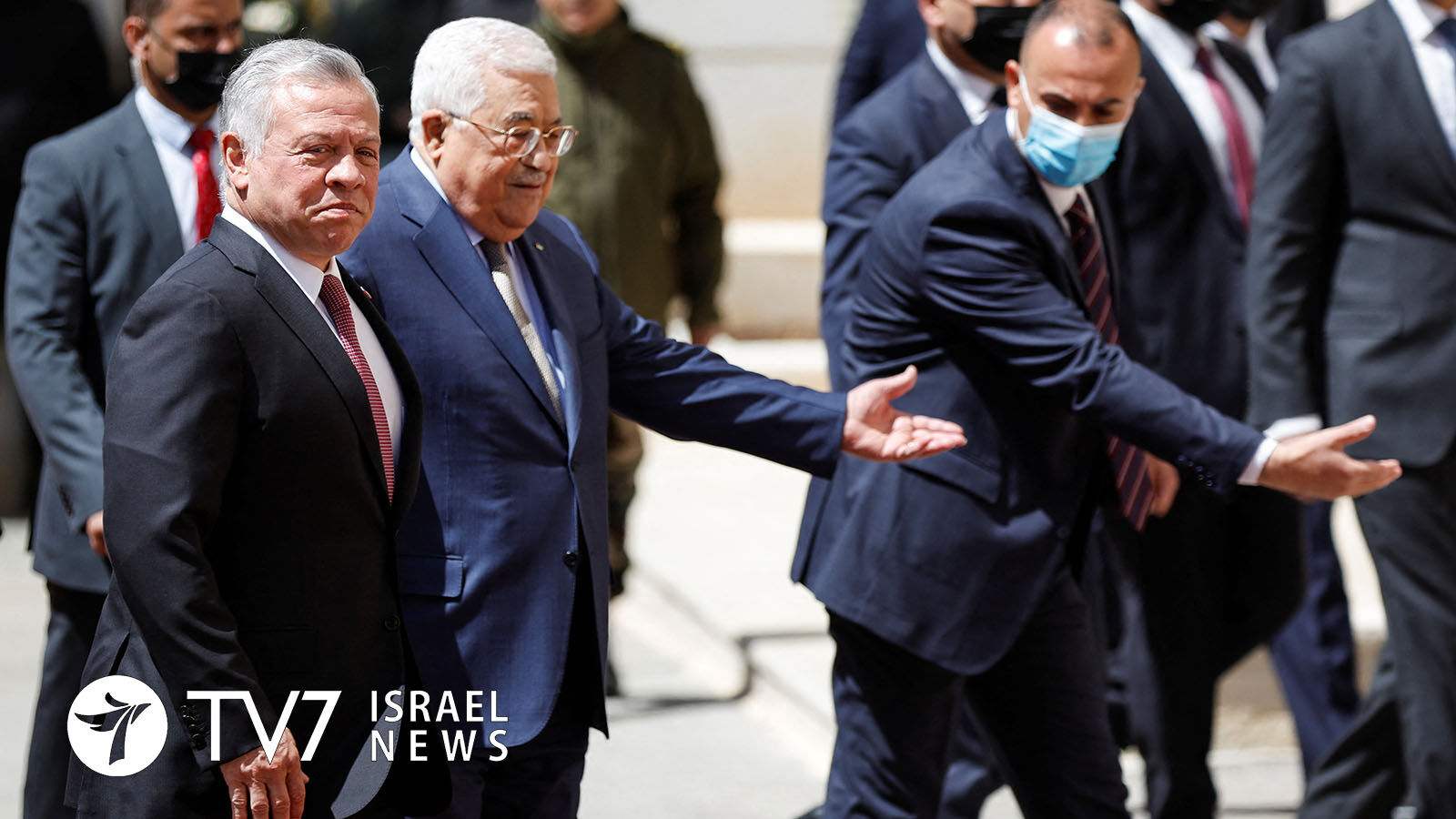King Abdullah II of Jordan traveled to the Ramallah headquarters of the Palestinian Authority (PA) on Monday for a meeting with Palestinian President Mahmoud Abbas.
By Erin Viner
“We and Jordan are one,” Abbas was heard telling the Hashemite Kingdom monarch on a video released by the Jordanian Royal Court.
“Our interests, concerns, pain and hope are the same,” he added.
The two leaders met during King Abdullah’s first visit to the West Bank in almost five years.
The Jordanian King also called for a halt to “all unilateral measures, especially those in Jerusalem and the Noble Sanctuary,” in reference to the Temple Mount complex in the Old City where the Al-Aqsa Mosque is situated.
The Palestinian-Jordanian talks come amid rising tensions between Israel and the Palestinians, including two terror attacks by Arabs affiliated with the Islamic State that claimed the lives of six Israelis over the past week.
Earlier this month Israeli Foreign Minister Yair Lapid traveled to Amman for his second meeting with King Abdullah to coordinate strategies to secure calm in Jerusalem, a frequent flashpoint of Palestinian protests, particularly over the observance of the Muslim fast month of Ramadan set to begin this Saturday. Concern over over a resurgence of Palestinian rioting during the Islamic holiday was also a topic of discussion in Washington recently between top United States officials and the Director of the Israeli Security Agency (ISA), Ronen Bar.
Last year, Ramadan was marred by serious clashes between Palestinian rioters and Israeli police in Jerusalem, holy to all three faiths. The wave of violence helped stoke the 11-day Operation Guardian of the Walls last May, when Palestinian terror groups in Gaza fired over 4,000 missiles at Israel – starting in Jerusalem.
While Israel asserts sovereignty over all of Jerusalem as its “eternal and indivisible capital,” Jordan’s Hashemite ruling family is the Custodian of Muslim and Christian holy sites in the city administered by the Amman-backed Waqf Islamic authority.
Jerusalem was reunited in the 1967 Six Day War, when Israel captured the eastern portion of the city and parts of the West Bank from Jordan, the Golan Heights from Syria, and Gaza from Egypt.
Abdullah reportedly told the Palestinian President that he came to “listen to you and hear from you what is demanded of the Jordanians.” He also said that his country as “the closest” to the Palestinian cause. At least 2.18 million Palestinians living among the overall population of 11 million people in the Hashemite Kingdom have registered as “refugees,” who left Israel the year it was founded in 1948 or in 1967.
The Jordanian leader was also in Ramallah at the same time Minister Lapid was hosting an historic Israeli-Arab summit. The foreign ministers from Morocco, Egypt, the United Arab Emirates, and Bahrain and United States Secretary of State Antony Blinken participated in the Negev Summit; although Amman declined Jerusalem’s invitation to attend.
In addition to the bolstering of regional security and economic cooperation, the respective top diplomats also highlighted their hopes to revive the long-stalled Palestinian-Israel peace process.
“It is by us standing together, it is by our people-to-people relationship, it is by creating a better environment for our businesses to work with each other. That’s the way we can go after the narrative of hate, of incitement, of terror. We will prevail, no doubt; it’s going to cost us. But, it matters,” said Emirati Foreign Minister Sheikh Abdullah bin Zayed bin Sultan Al Nahyan at the conclusion of the summit.
Moroccan Foreign Minister Nasser Bourita said his presence at the summit, “under instructions of his Majesty King Muhammad VI,” was meant to send two messages: that relations with Israel were established in “a move of conviction” and not opportunism, and that “we are here today, because we genuinely, sincerely and deeply believe in peace. Not that kind of passive peace where we turn our backs to each other and peacefully ignore each other but rather we believe in a thorough, fruitful paradigm shaping and value creating peace.”
US Secretary of State Antony Blinken, who met with top officials in both Jerusalem and Ramallah while in the region, said, “We have to be clear that these regional peace agreements are not a substitute for progress between Palestinian and Israelis. One of the issues that we’ve discussed today was how countries involved in the Abraham Accords and normalization, as well as those that have longstanding diplomatic relationships with Israel, can support the Palestinian Authority and the Palestinian people in concrete ways and have a positive impact on the daily lives of Palestinians in the West Bank and Gaza. This is a conversation we will carry forward so that we can work toward our goal that Palestinians and Israelis enjoy equal measures of freedom, security, opportunity and dignity and create the conditions for a negotiated two state solution. Finally, as neighbors, and in the case of the United States, as friends, we will also work together to confront common security challenges and threats – including those from Iran and its proxies.”
Concurring, Egyptian Foreign Minister Sameh Shoukry commented that the Negev Summit “has given us the opportunity to highlight views related to how we could further progress in achieving our common objectives and it certainly did during these discussions we did highlight the importance of the Israeli-Palestinian peace process; the importance of maintaining the credibility and the viability of the two state solution that for Israel and the Palestinian state to live side-by-side in peace with recognized borders for the Palestinian state in accordance with the 67’ lines with east Jerusalem as its capital.”
It is important to note that Palestinian Prime Minister Mohammad Shtayyeh expressed outrage over the Israeli-Arab summit just ahead of its being held.
“We’re following with concern Israel’s movement in the region. Arab normalization meetings without ending the Israeli occupation of Palestine are just an illusion, a mirage, and a free reward for Israel,” he told Palestinian lawmakers in Ramallah.
